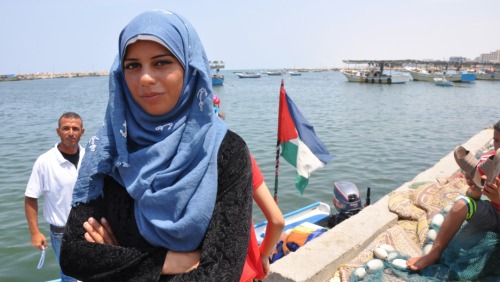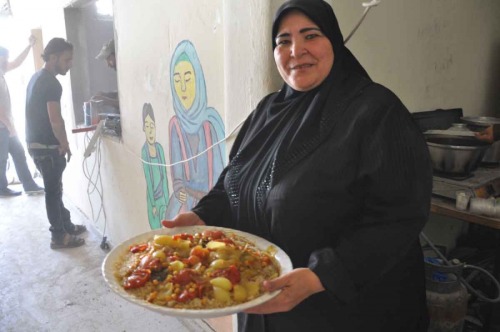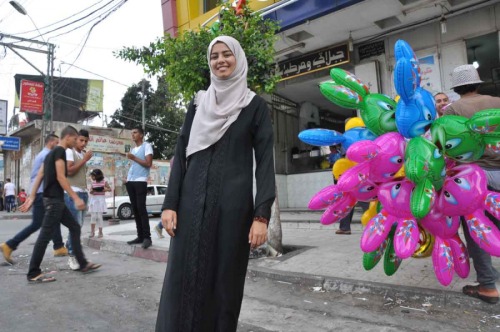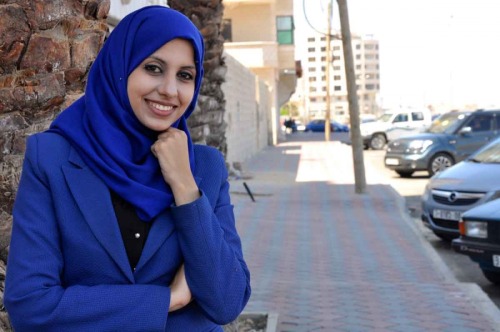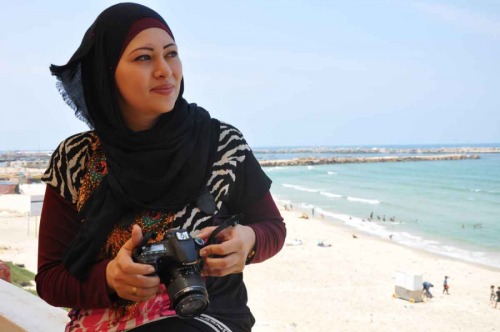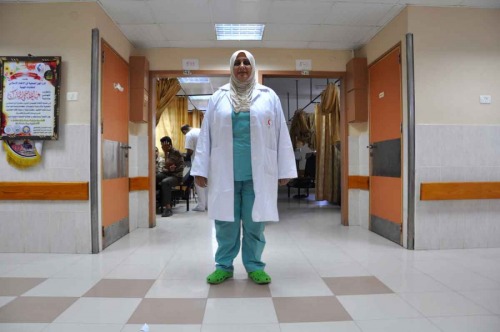myvoicemyright:Here are 6 women trying — against all odds — to build a future for GazaMa
myvoicemyright:Here are 6 women trying — against all odds — to build a future for GazaMadeleine Kulab grew up by Gaza’s glistening blue sea, watching the waves crash into the strip’s 25-mile Mediterranean coastline. But at 13, when her father, who suffered from a form of palsy, could no longer fish, Kulab took the helm and became her family’s breadwinner.Now 21, she says becoming Gaza’s first and only fisherwoman was not easy, both because she is a women and because she lives in a society whose dysfunctional relationship with Israel takes a daily toll. “Even the sea isn’t free here,” Kulab says. “People always looked at me and teased or scolded my dad … they didn’t take me seriously. But we ignored them.”Jameela Dallol remembers the first, and perhaps only, time she fell in love. She was 16-years-old and her mother, a talented cook, left her in their small kitchen to prepare bamiye, an okra stew.“She told me just to prepare the ingredients, so that when she returned she could cook a feast for us,” recalls Dallol. “But I was daring and said to myself, ‘No, I’m going to cook the whole thing.’”When her mother returned to a deliciously familiar aroma wafting through their small apartment, she was shocked. Especially since Dallol’s bamiye was just as good, perhaps even better.Ever since, Dallol has relied on cooking to make a living for her family of 12 in the poor Zeitoun area of Shejaiya, a neighborhood heavily affected by last summer’s war. After returning from a rare trip to the West Bank, a Palestinian territory, when she was 18, she credits herself for introducing the whole neighborhood to Musakhan — a Palestinian dish of roasted chicken baked with onions, sumac, spice, saffron and fried pine nuts that’s now famous among her customers and friends.In 2000, she decided to use her love of food to lift other women up. She started “Dallol’s Kitchen” — a community initiative of 17 women who depend on the sale of their meals to make a living for their families. Having never married — which sometimes attracts the sneers of a closed society — she lives with her siblings and takes care of their children.“I’m the breadwinner and the breadmaker,” she says. “It’s my fate … I wouldn’t have it any other way.”One of the most promising students in the Gaza Strip, Amal Ashour dreams of becoming a famous literature buff. In her third year at Gaza’s Islamic University and one of the top students in her class, she’s fallen in love with Elizabethan literature.“I feel like I’m moving across the ages,” she says. “Literature is always a nice vacation from Gaza … you go deep into human emotion.”Her love of English literature was sparked during her senior year of high school, when she received a rare opportunity to study in Minnesota through a US-government funded program.“It was freedom,” she says. “Once you get a taste of that, it’s hard to come back.”Ashour still cherishes the diary she started in the US, pages filled with adventures — new sights and sounds. When she got back to Gaza, she stopped writing in it. “Every day here is a routine … nothing is new,” she says. “Routine is the killer.”When 25-year-old Mariam Abultewi was a child growing up in Gaza’s El Nuseirat refugee camp, she dreamed of becoming Albert Einstein or Isaac Newton. “Everyone in Gaza wants to be a doctor or an engineer, but I wanted to do something with technology … I wanted to solve problems,” she says. “Technology is the new life-saver.”The computer engineering graduate knew it would be difficult to find a glimmer of opportunity in a place where few graduates can obtain work. But when she heard about Gaza Sky Geeks —Gaza’s first and only startup accelerator administered by the international charity, Mercy Corps, she finally saw a chance.While studying at the University of Gaza, where 60 percent of the IT program is made up of women, she founded Wasselni, a social carpooling network for transportation in Gaza. She is the first female startup founder in Gaza to receive investment through Gaza Sky Geeks, and hopes to scale the idea across the region.Like many women in Gaza, Walaa Saafin was married off at a young age. At 17, she had big dreams, but few options. Her husband assured her that she could continue her education and become the successful journalist she had always dreamed of being, but that all changed after she started having children.“He didn’t approve of my being a strong woman … of leaving the house for interviews, of talking with men,” she says. “Men here are close-minded and Gaza forces us to live in these small worlds without oxygen.”Two years ago, she gained the courage to divorce him, a tough feat in a territory where few women are economically independent. But her bravery came at a price. He only allows her to see their children once every two weeks. She’s fought him in court, but inheritance and custody rights are a protracted battle in Gaza’s less than equitable society. She also faces the judgment of other women, who she says perceive her to be a bad mother.“It’s been heartbreaking, but I did it for my kids,” she says. “I didn’t want them growing up seeing me trapped.”Still, she keeps hope. And while she vowed to ward off men, one photojournalist saw her reporting during last summer’s war and later Facebook messaged her. She ignored him for a while, but he persisted and they soon fell in love and recently became engaged — something of a small controversy in a society in which it’s rare for a young, never-married man to marry an older divorced women with children. On a recent weekend, they spent the day with her children at an amusement park, hopping from ride to ride and taking selfies — small pleas to experience and capture stark normalcy amidst anything but.Living in Gaza can be as difficult as performing brain surgery, jokes Mona Keskin, sitting in a squalid, dusty office at Shifa Hospital, the largest medical complex in the Gaza Strip.She should know — she’s Gaza’s only female neurosurgeon.From a young age, Keskin was fascinated by the power of the brain. But when she told her father she wanted to study neurosurgery, he discouraged her. “You’ll never find a husband,” he said. “And you’ll never have a family.”Still, she pressed on and attended medical school in Kazakhstan on a scholarship. When she returned to Shifa Hospital for her residency, instructors and colleagues were “just watching [her], waiting for [her] to make a mistake.” And one of her first male patients initially refused to be treated by her.“‘Fine, whatever’ I told him, ‘Good luck taking care of yourself,’” she recalls. Moments later he came rushing out of the room, pleading for her to return.“Look, as a woman, you don’t always have to be polite,” she says. “You have to stand your ground. You can’t worry about being nice.” -- source link
Tumblr Blog : zouaib.tumblr.com
#gaza#palestine
